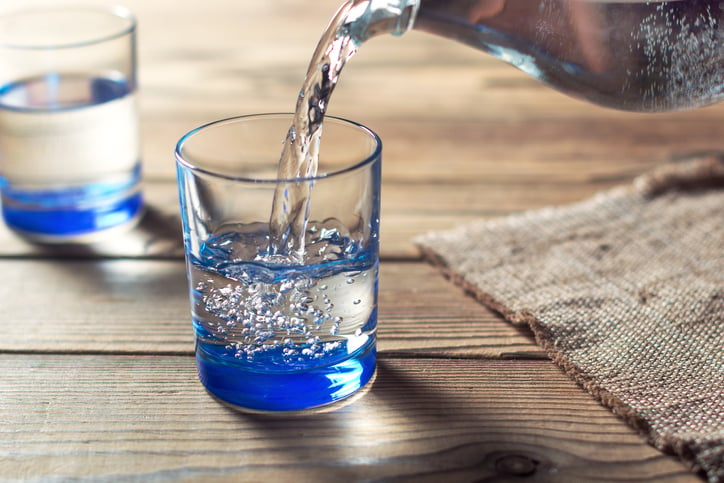Do Water Filters Really Make Your Water Better?

In our society, water is plentiful. It’s all around us: we can get gallons in minutes just by turning on the faucet, so it’s easy to take it for granted, especially when it comes to drinking water.
We know drinking plenty of water is vital for our overall health. Our bodies are made up of mostly water (about 55 to 60%), and while we can survive around three weeks without food, we can survive only around three DAYS without water. According to The Institute of Medicine guidelines, we need around 2.7 (women) to 3.7 liters (men) of water per day.
Is Bottled Water Better than Tap?
With so many bottled drinks to choose from, cool packaging, fancy ingredients, popular name-brands and more, it seems rare these days to actually see someone drinking plain, good-old-fashioned water, much less drinking water directly from the tap. (Many of you are likely already cringing!)
A lot of folks react with horror when they see you taking a big swig of water from the tap. But, is filtered or bottled water really any better? You might be surprised to discover that studies show only around 66% of bottled water purchased is actually filtered. As it turns out, even that fancy bottled water is often mostly just plain old tap water. Back in the day, there was even a joke circulating that the popular bottled water “Evian” was just “naïve” spelled backwards. Yet according to statistics, people worldwide spend about a billion dollars a year on filtered and bottled water.
That’s a lot of money. Is it really worth it?
The EPA and The Water You Drink
If you live in the United States, the Environmental Protection Agency (EPA) monitors the safety of the water you drink. Some of the laws that help this agency supervise the health of our water systems include the Clean Water Act and the Safe Water Drinking Act.
The Clean Water Act (CWA), which originated in the United States in 1948 but was completely revamped in 1972, is designed to protect wetlands, enforce environmental laws, report on water pollution, and monitor wastewater treatment. The Safe Water Drinking Act (SWDA) was initiated to ensure the quality, safety, and health of our drinking water sources.
The EPA uses both of these laws to help reduce the environmental risks we face and to ensure our water is safe to drink from the tap—and also to let us know when it is not safe, such as in the case of Flint, Michigan. The EPA regulates for more than 90 contaminants and also identifies and lists unregulated contaminants in our water. They also require the removal of microorganisms, but unfortunately, other impurities like pesticides, metals, chemicals, and more can still remain in your water supply. You can contact your local utilities company for a list of contaminants found in the water supply in your local area.
That said, while the EPA is responsible for ensuring our water is potable (i.e., safe to drink), as mentioned above, there may be situations when it isn’t. According to the EPA, 90% of the U.S. public water systems meet their standards. Yet, it doesn’t remove all contaminates, so it seems prudent to take the extra step to filter your water further even when it meets requirements.
What Types of Water Filters Are Available?
There are many ways to get your drinking water, but one of the most popular ways (because it’s affordable, convenient, and helps reduce unnecessary waste from all those polluting plastic bottles and caps) is by simply filtering your tap water. There are many types of filters to choose from, such as water filters for individual drink containers, filter pitchers, countertop water filters, under sink water filters, refrigerator filters, water filtration systems for your whole home, and more. There are even filters to install in the shower. There are numerous brands and styles. Here are a few brands you may recognize:
Brita—perhaps the most well-known among the bunch, Brita water pitchers and faucet filters have been around for years.
Pur—also a contender for the most well-known, especially for filters that can easily be placed directly on your faucet for ease of use.
Zero Water—a little pricier than its similar counterparts, this company uses a five-step filtration system to remove all contaminants.
Apex—their countertop water filter system not only filters out contaminants, but it even adds good minerals back into your water! And they also have whole-house water filtration systems and options in just about every price range.
Rainshow’r—this is a shower filter that helps remove chlorine from your water as you bathe to keep contaminants off the largest organ of your body—your skin.
Aquasana, Crystal Quest, & Pelican Water—these are other brands that offer everything from countertop water filters to shower filters to whole home water filtration systems.
Water filters take your water to the next level by filtering out things that are still deemed “acceptable” by the EPA but are not necessarily things you want to consume or even bathe in. However, just because you’re filtering your water doesn’t mean you’re getting every impurity out of it. The water companies are not mandated to remove every type of contaminant, and not all water filters are able to remove everything either. But, it’s still a great idea to do what you can to purify your drinking water and the water you use in your home, when possible.
The Next Best Step?
- Find out what’s in your water—your water company should provide you with a yearly water report called a “Consumer Confidence Report” which contains information about your water supply. Alternatively, you can also use the EWG Tap Water Database.
- Analyze Your Consumer Confidence Report—this report will provide you with the following information:
- The source of your water supply
- What is in your water supply, including pollutants and other contaminants.
- Filter for the right things—if you’re filtering for the wrong things, then your filter is not effective for you. Many filters will target chlorine, zinc, copper, cadmium, and mercury.
What to Look for in a Water Filter
- Stages of Filtration—look for how many stages of filtering your particular device offers. Usually, you want at least a pre-treatment and post-treatment stage.
- Type of Filtration—many water filters use a carbon filter made up of activated carbon granules.
- Capacity—how many glasses or gallons of water will each filter cartridge purify?
- Cost—this can vary based on name brand, style of filtering system, and where you decide to purchase your water filters.
- Ease of Use—if your filtration system is too much of a hassle, you’re less likely to keep up with it.
- Speed of Filtration—if it takes forever for your water to go through the filter, you may become impatient and not use it on a regular basis.
- What It Filters—of course, you want to make sure your filter is doing its job and filtering out the contaminants you need it to!
The Bottom Line on Water Filters
So, what’s the bottom line when it comes to water filters? The answer is yes, water filters really do make a difference in the purity of your water. While water filters may not be able to save you from every contaminant present in your drinking water, some filtering is, by far, better than none.
This is a case of good, better, best. If you must drink tap water, it’s probably going to be okay—especially in the vast majority of cities in the U.S. If you use a common filtering system like a Brita or a Pur; that’s better, and if you can use a whole home 9-stage filtration system, well, I’d call that the best case scenario.
**In the reference section below, we have listed resources where you can get information about the quality and safety of your water.







